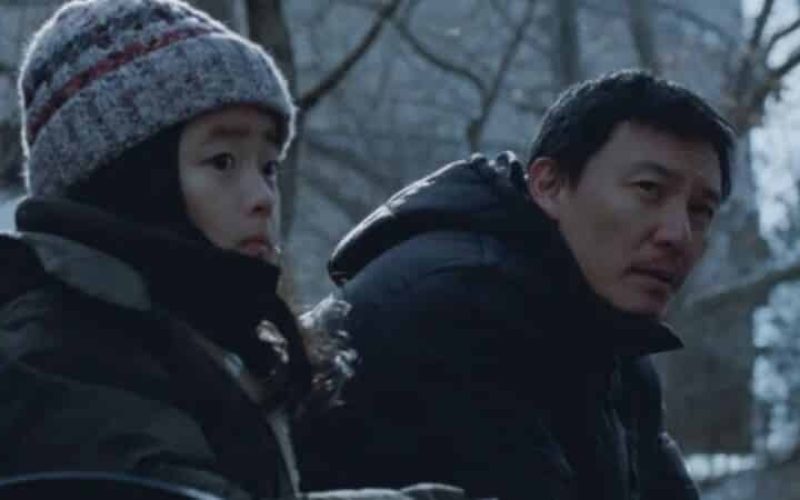In a city where you can order dumplings, sneakers, or a drill bit without ever leaving your couch, it’s easy to forget real people are hustling behind every “delivery complete” notification. Lucky Lu, the debut feature from Korean-Canadian director Lloyd Lee Choi, pulls those invisible lives into focus and gives them the dignity they rarely get.
Set in the gritty heart of New York City, Lucky Lu follows a single day in the life of Lu, a Chinese food delivery rider played with quiet intensity by Chang Chen. When his electric bike, his lifeline, is stolen, his already-precarious world starts to spiral. He’s got just a few hours to figure something out before his employer hits him with a fine. Oh, and his wife and daughter are landing in New York that night. No pressure.
Lucky Lu: A Day That Feels Like a Lifetime
What makes the film hit so hard is its real-time structure. We follow Lu through a hectic, often heartbreaking day as he chases down his stolen bike, scrapes together money, and tries to stay emotionally together. There’s no dramatic score pushing your emotions, just the tension of survival, the kind you can feel in your chest.
This isn’t your typical immigrant story. There’s no romanticizing of hardship here. The film portrays the grind exactly as it is: relentless, lonely, and marked by quiet sacrifices that often go unnoticed. Every interaction Lu has with fellow migrants, employers, and strangers feels like a little transaction. Even kindness has an edge.
What’s striking is how Lu’s story isn’t just his own. It mirrors what countless gig workers and undocumented migrants face every day: no safety net, no backup plan, and the constant pressure to deliver, literally and figuratively.
Bicycle Thieves Meets DoorDash
Choi has said Lucky Lu takes inspiration from Bicycle Thieves, the Italian classic that defined neorealism. And yeah, you can see it. But this isn’t just some modern retelling, it’s a sharp update that speaks directly to our app-driven, hustle-heavy world.
In Bicycle Thieves, losing a bike meant losing a job. In Lucky Lu, it’s that and then some. It’s losing your dignity, your hope, and your chance to reunite with your family once and for all. And the kicker? It all happens in one of the wealthiest cities in the world, a place full of dreams but cold as steel if you’re not already “in.”
New York, Beautiful and Brutal
Visually, the film nails the contradictions of New York. Shot by Norm Li, the cinematography walks a fine line between beauty and claustrophobia. The camera stays tight on Lu, almost like it’s chasing him. The city around him buzzes with life, but Lu is always just a beat behind, overlooked, overworked, and completely alone.
Still, Lucky Lu finds its heart in the little things. A glance at a crumpled photo. A moment of hesitation before making a desperate move. The raw love Lu has for his family pulses under every decision, no matter how flawed or frantic. And it’s those tiny, human moments that make the film unforgettable.
More Than One Man’s Story
This isn’t just about Lu. It’s about an entire workforce we all depend on but rarely see, let alone think about. Delivery riders, cleaners, construction workers, and nannies. People who keep the city running are treated as disposable. Lucky Lu gives them a voice, even if it’s a quiet one.
And it doesn’t take the easy way out by painting villains. Everyone Lu encounters is just trying to survive, just like him. Even those who take advantage of him aren’t evil. They’re trapped in the same broken system. It’s that moral gray area that gives the film its emotional weight.
Backed by Forest Whitaker, Led by a Fresh Voice
The film also has some serious backing. Forest Whitaker came on as executive producer, bringing not just credibility but a spotlight that could help push the story to a broader audience. As for Choi, this is only his first feature, but it’s clear he’s got something special. His ability to blend realism with emotional resonance is rare, and it makes you excited for whatever he does next.
Final Thoughts: Quiet, Devastating, and So Damn Real
Lucky Lu doesn’t shout. It doesn’t have to. Its power lies in the silence between words, the exhausted looks, the soft desperation. It leaves you thinking about the people behind every food delivery, every Amazon package, every service we take for granted. If you’ve ever breezed past a delivery worker on your way to brunch, Lucky Lu will make you stop and look again. Maybe, just maybe, it’ll make you see them not as workers, but as people with families, dreams, and fears of their own.








